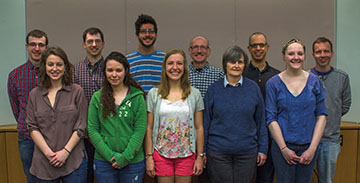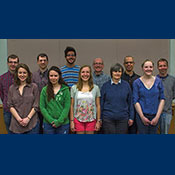PROFESSOR BRIAN COPPOLA & CSIE|UM PARTICIPANTS (Chemistry, College of Literature, Science, and the Arts) won the Provost's Teaching Innovation Prize in 2016 for their project, Improving Instruction and Nurturing Future Science Educators.

Launched in 2014, the Chemical Sciences at the Interface of Education (CSIE|UM) program models a way to institutionalize faculty-led engagement in instructional development throughout a department. Faculty form teaching groups (analogous to research groups) supported by internal funding and the administrative leadership of a new Associate Chair for Educational Development and Practice. In turn, the teaching groups bring together undergraduate students, graduate students, and postdoctoral associates to undertake meaningful projects that also develop their professional skills. Below are some of the creative opportunities for chemists who are passionate about both research and teaching:
- Future Faculty GSI (FFGSI) appointments redirect 10 hours per week from teaching responsibilities to an education project.
- “Dual mentorship” postdoctoral associates teach as a lecturer one-third of the year while continuing with their research group.
- Undergraduate Structured Study Group (SSG) leaders co-design and fully implement the instructional program for Honors sections in several introductory courses.
- Students lead the organizing committee that initiates CSIE|UM programming, including an annual symposium.
Institutionalizing CSIE|UM delivers a clear and coherent message that formal work in education is not the hobby of an exceptional few, but a goal to pursue alongside other scholarly activities.
https://sites.lsa.umich.edu/csie-um
Coppola, B. P. (2016, May-June). Broad & capacious: A new norm for instructional development in a research setting. Change: The Magazine of Higher Learning.
Student Comments
The Structured Study Group (SSG) experience “taught us to be critical, creative, engaged, and ethical scientists.”
“First-semester organic, Chem 210 jumpstarted my career [due to] the quantity and variety of learning resources and the manner in which coursework facilitated intellectual exchange among students.”
“Opportunities to teach as an undergraduate made me aware of areas that I needed to improve upon early in my teaching career and provided a support system through which these issues could be discussed and addressed.”
“SSG was our first encounter with true peer review and peer-to-peer education in an ‘art studio’ format with rigorous constructive critique and communication of knowledge.”
“Our focus on ‘students as teachers’ and data display was directly inspired by SSG coursework.”
Confronting research science as “‘the real thing’ stoked our enthusiasm and was outstanding preparation for graduate school and beyond.”
“CSIE|UM is going viral; I am not alone in replicating parts of the program that work at my institution, and now my own students are having the same success that I did.”





